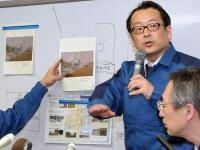BOB GARFIELD: This week Japanese Prime Minister Naoto Kan sat down with the executives of Tokyo Electric Power Company, or TEPCO, the utility in charge of the nuclear power plants in Japan, and demanded to know what the hell is going on. He was speaking for a nation that had been bombarded by confusing reports and conflicting information, since the nuclear crisis first began last weekend. Even the institutionally polite Japanese media have reacted harshly to TEPCO’s mismanaged press conferences. And on Tuesday, the government announced the formation of a joint crisis headquarters inside the utility company. Michael Cucek is a political analyst and research associate with the MIT Center for International Studies, who has lived in Tokyo since 1994. He says that while confusing information about radiation levels has worried many in Japan, TEPCO has compounded the anxiety with its mismanagement of rolling blackouts.
MICHAEL CUCEK: Tonight, for example, TEPCO announced a cutoff of electrical supplies and caused yet another panic in the capital. Everybody tried to rush home before supposedly all the train lines were going to lose power. Lo and behold, the train lines didn't lose power, but there were lines of thousands of people trying to get onto trains and try to get home before the power outage that never arrived. In their most egregious fault, they turned off the power to one city that had been hit by the tsunami. The governor of the prefecture called TEPCO people into his office and he berated them. This has dashed anybody’s sense that TEPCO knows what it’s doing. Unfortunately, TEPCO employees are the only people on the ground at the nuclear site. There’s no one else to turn to for information.
BOB GARFIELD: So the nation is depending for its survival on the very institution it trusts the least.
MICHAEL CUCEK: That’s a very good way of putting it.
BOB GARFIELD: Tell me about the media. Newspapers and TV tend to be polite, if not deferential, to institutional subjects. Has their treatment of TEPCO evolved during this crisis?
MICHAEL CUCEK: The reporters at the press conferences have been very sharp in their questioning and, in fact, dismissive of the information or misinformation that they're receiving. However, that doesn't always make it out to the public. Media institutions here in Japan are controlled by a media law that requires balance in the way reporting is done. It’s defined by bureaucrats and the government, and if you say something that the government doesn't like it can affect your ability to continue to do reporting. So they are deferential not as a cultural matter but because there is a - a legal requirement.
BOB GARFIELD: In the States, in the wake of Hurricane Katrina, Anderson Cooper of CNN famously became impatient with government’s failures and acted out on air in frustration. Has there been any such moment in the Japanese press?
MICHAEL CUCEK: The most influential newscaster in the morning is a man named Mino Monta. He, after hearing one TEPCO press conference, just lost it and said, you know, they should just stop having press conferences. If they're telling us things that we don't understand or they have nothing to tell us, they should not have these events. That is a, a major breaking point because he is an extremely influential man. And it indicates that it’s okay to no longer trust TEPCO.
BOB GARFIELD: So now that the government has seized control of the public information operation, I wonder about how much trust the government commands among the Japanese population.
MICHAEL CUCEK: What they've done is a double-edged sword. By taking over TEPCO news releases they, unfortunately, take on TEPCO’s worst attributes, as well. And that can hurt the government, but the government didn't have much of a choice. It, it was finding out things from the news media before it was being told by TEPCO.
BOB GARFIELD: As we speak on Thursday, the fuel rods, the sources of the radiation, reportedly are completely exposed, and yet the government has not changed its recommendation for evacuation beyond the 20-kilometer zone that it previously established. The United States is telling its nationals in the area who live within 50 kilometers of the plant to get the hell out. What does that tell you about the government’s predicament?
MICHAEL CUCEK: The United States’ recommendation to its citizens to stay 50 kilometers away from the plants, it’s on a voluntary basis. The Japanese government’s two rings of defense, one where – the 20-kilometer ring, which is completely evacuated and the 20-to-30 kilometer range, where the recommendation is don't leave your home, and if you wear clothes outside don't bring them into the house - those are mandatory. Currently, news organizations are doing things like informing people on how to live an irradiated life, what you should wear, what you should do with vegetables and fruit. There’s a sense of there’s no point in being panicked because there’s no place where we can go.
BOB GARFIELD: Michael, thank you very much.
MICHAEL CUCEK: You’re welcome.
BOB GARFIELD: Michael Cucek is a political analyst and research associate at the MIT Center for International Studies in Tokyo.
[MUSIC UP AND UNDER]

